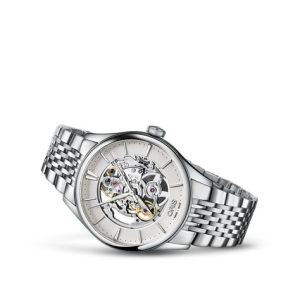Uncategorized
Understanding Watch Certifications: COSC, ISO, and More
When it comes to buying a high-quality watch, the certifications associated with a timepiece can be as important as its design and features. Certifications serve as proof of a watch’s craftsmanship, reliability, and accuracy, ensuring that the watch meets certain industry standards. Among the most well-known certifications are COSC (Swiss Official Chronometer Testing Institute) and ISO (International Organization for Standardization), but there are several other certifications and standards that signify different aspects of a watch’s quality. Understanding these certifications will help you make an informed decision when buying a watch, especially if you’re looking for precision, durability, and reliability.
In this article, we will take a closer look at the most important watch certifications, including what they mean, how they are awarded, and why they matter.
1. COSC (Swiss Official Chronometer Testing Institute)
What It Is: The COSC certification is one of the most prestigious in the world of horology, reserved for watches that meet very strict standards for accuracy and precision. COSC is an independent, non-profit organization that tests watches for their chronometric performance. To receive the COSC chronometer designation, a watch must meet precise standards for timekeeping.
How It Works: Watches that are submitted to COSC undergo a series of tests over a period of 15 days. These tests measure the watch’s accuracy, which must fall within a specified range: typically, -4 to +6 seconds per day for mechanical watches. During testing, the watch is tested in different positions and temperatures to simulate real-world conditions.
Why It Matters: Watches with the COSC certification are considered to be highly accurate. The chronometer designation signifies that the timepiece has passed a series of rigorous tests, ensuring precision and reliability. Brands like Rolex, Omega, and Patek Philippe often advertise their chronometer-certified movements, as it serves as a mark of quality.
What It Means for You: If you’re looking for a watch that offers exceptional timekeeping accuracy, choosing a COSC-certified chronometer is a solid option. These watches are typically seen as premium products due to the rigorous testing required, and they can be trusted to maintain excellent accuracy over time.
2. ISO (International Organization for Standardization)

What It Is: The ISO is an international body that sets global standards across various industries, including horology. Several ISO standards apply specifically to watches, most notably ISO 6425, which relates to dive watches, and ISO 9001, which ensures quality management processes. ISO standards for watches ensure that the watch meets certain performance criteria related to its specific use case, such as water resistance, shock resistance, and more.
ISO 6425: Dive Watches ISO 6425 is the standard for dive watches and is recognized as the international benchmark for water resistance in dive timepieces. A watch must meet specific criteria related to water resistance, legibility, and other technical features to be certified as an ISO 6425 dive watch.
- Water Resistance: A certified dive watch must be water-resistant to at least 100 meters.
- Legibility: The dial must be easy to read in low-light conditions, often requiring luminescent markers.
- Helium Escape Valve: For deeper dives, some watches are required to have a helium escape valve, which allows gas to escape during decompression.
- Shock Resistance: Dive watches must be resistant to shock and vibrations.
ISO 9001: Quality Management Systems ISO 9001 certification is a standard for quality management and helps ensure that a company consistently provides products that meet customer and regulatory requirements. For watchmakers, achieving this standard indicates that the brand’s manufacturing processes are standardized, controlled, and of high quality.
Why It Matters: ISO certification indicates that a watch adheres to strict international standards for its specific functionality. For example, if you’re buying a dive watch, knowing that it meets ISO 6425 standards guarantees that the watch is built to withstand the conditions of underwater exploration. If the manufacturer adheres to ISO 9001, you can also trust the consistency and quality of the watchmaking process.
What It Means for You: ISO-certified watches offer a high level of reliability and performance, especially in specialized categories like dive watches. If you’re in the market for a professional tool watch, ISO certifications can help ensure that the timepiece is up to the task.
3. Geneva Seal (Poinçon de Genève)
What It Is: The Geneva Seal is one of the most prestigious marks in watchmaking, indicating a watch that has been crafted in accordance with the high standards of the Geneva region of Switzerland. This certification is particularly associated with fine Swiss watchmaking and is awarded to watches that meet stringent requirements for craftsmanship, assembly, and finishing.
How It Works: The Geneva Seal requires that a watch’s movement is assembled, finished, and decorated in the Canton of Geneva. It focuses on the overall quality of craftsmanship, ensuring that the movement is impeccably made, with particular attention to decorative elements such as engraving, polishing, and finishing.
Why It Matters: A watch bearing the Geneva Seal is considered a work of art and a testament to the skill and craftsmanship of the watchmaker. It is often found on some of the finest luxury timepieces, such as those from Patek Philippe and Vacheron Constantin. This certification ensures that the watch has been crafted with the utmost care and attention to detail.
What It Means for You: If you’re looking for a luxury watch with impeccable craftsmanship and a high level of artistry, a Geneva Seal-certified watch is a great choice. These timepieces not only tell the time but are also considered collectible and are often passed down through generations.
4. Chronometer (Not COSC Certified)
What It Is: The term “chronometer” is often used to describe high-precision watches, but not all chronometers are necessarily COSC-certified. Some watch brands use the term to describe watches that meet their own rigorous standards for accuracy, even if they haven’t been officially tested by the COSC. However, true chronometers are those that have passed official COSC testing.
How It Works: A chronometer watch is designed for optimal accuracy and usually undergoes testing either by the brand itself or third-party institutions. Some brands, like Omega and Rolex, offer in-house chronometer testing programs that guarantee the precision of their movements.
Why It Matters: A chronometer-certified watch is one that has been tested for accuracy and shown to be precise within a certain range. Even if the watch is not COSC-certified, it still signifies a higher level of precision compared to ordinary timepieces.
What It Means for You: If you want a high-precision watch but don’t necessarily need COSC certification, a chronometer-certified watch from a reputable brand ensures that the watch is accurate and reliable for everyday wear.
5. Other Certifications and Standards

Beyond COSC, ISO, and the Geneva Seal, there are other specialized certifications and standards that might be relevant depending on the type of watch you’re considering.
- Master Chronometer: A certification by Omega that involves even stricter testing than COSC, including resistance to magnetic fields and extreme temperatures.
- Swiss Made: While not a technical certification per se, Swiss Made is a hallmark of quality for watches that meet strict manufacturing and assembly requirements in Switzerland.
- ATA (Air Transport Association) Compliance: Some watches, especially pilot watches, comply with this certification to ensure that they can withstand the rigors of aviation.
Conclusion
Understanding watch certifications like COSC, ISO, and the Geneva Seal can help you make a more informed decision when purchasing a timepiece. These certifications indicate that a watch meets or exceeds industry standards for accuracy, durability, craftsmanship, and reliability. Whether you’re buying a dive watch, a luxury timepiece, or a smartwatch, knowing what certifications are associated with the watch will give you peace of mind and ensure you’re investing in a quality product. Choose wisely, and you’ll not only have a functional timepiece but also a reliable companion for years to come.

